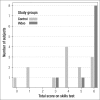Use of instructional video to prepare parents for learning infant cardiopulmonary resuscitation
- PMID: 19381314
- PMCID: PMC2666859
- DOI: 10.1080/08998280.2009.11928493
Use of instructional video to prepare parents for learning infant cardiopulmonary resuscitation
Abstract
Parents of premature infants often receive infant cardiopulmonary resuscitation (CPR) training prior to discharge from the hospital, but one study showed that 27.5% of parents could not demonstrate adequate CPR skills after completing an instructor-led class. We hypothesized that parents who viewed an instructional video on infant CPR before attending the class would perform better on a standardized skills test than parents who attended the class with no preparation. Parents randomized to the intervention (video) group viewed the video within 48 hours of the CPR class. Parents in the control group attended the class with no special preparation. All parents completed the CPR skills checklist test, usually within 7 days after class and before the infant's hospital discharge. The test rated subjects' skills in the areas of assessment, ventilation, and chest compressions; each section was rated as good, fair, or fail. In this pass/fail test, students had to be rated good or fair on all three sections to pass. All 10 subjects in the video group passed the test versus only 9 of 13 in the control group, but this difference was not significant (P = 0.08). However, 8 of 10 (80%) subjects in the video group were rated as good on all three sections, versus only 3 of 13 (18.7%) in the control group, and this was a significant difference (P = 0.012). We conclude that preparation of students using an instructional video prior to infant CPR class is associated with improvement in skills performance as measured by a standardized skills test. Video preparation is relatively inexpensive, eliminates the barrier of reading ability for preparation, and can be done at the convenience of the parent.
Figures
Similar articles
-
Comparison of cardiopulmonary resuscitation training methods for parents of infants at high risk for cardiopulmonary arrest.Ann Emerg Med. 1998 Aug;32(2):170-7. doi: 10.1016/s0196-0644(98)70133-7. Ann Emerg Med. 1998. PMID: 9701300 Clinical Trial.
-
A controlled trial of cardiopulmonary resuscitation training for ethnically diverse parents of infants at high risk for cardiopulmonary arrest.Crit Care Med. 2000 Sep;28(9):3289-95. doi: 10.1097/00003246-200009000-00029. Crit Care Med. 2000. PMID: 11008994 Clinical Trial.
-
CPR training without an instructor: development and evaluation of a video self-instructional system for effective performance of cardiopulmonary resuscitation.Resuscitation. 1997 Jun;34(3):207-20. doi: 10.1016/s0300-9572(97)01096-4. Resuscitation. 1997. PMID: 9178381
-
The problem of poor retention of cardiopulmonary resuscitation skills may lie with the instructor, not the learner or the curriculum.Resuscitation. 1991 Feb;21(1):67-87. doi: 10.1016/0300-9572(91)90080-i. Resuscitation. 1991. PMID: 1852067 Review.
-
Mechanical versus manual chest compressions for cardiac arrest.Cochrane Database Syst Rev. 2018 Aug 20;8(8):CD007260. doi: 10.1002/14651858.CD007260.pub4. Cochrane Database Syst Rev. 2018. PMID: 30125048 Free PMC article.
Cited by
-
The effect of CPR educational package on knowledge and performance of nurses working in intensive care units: A review study.J Family Med Prim Care. 2022 May;11(5):1677-1682. doi: 10.4103/jfmpc.jfmpc_1938_21. Epub 2022 May 14. J Family Med Prim Care. 2022. PMID: 35800549 Free PMC article. Review.
-
Comparison of Efficacy in Improving Cardiopulmonary Resuscitation Performance between Video Training and the Standard Method.J Tehran Heart Cent. 2018 Jul;13(3):155-156. J Tehran Heart Cent. 2018. PMID: 30745931 Free PMC article. No abstract available.
-
Basic life support training targeted to family members or carers of those at high-risk of out-of-hospital cardiac arrest: a systematic review.Resusc Plus. 2025 Jul 15;25:101031. doi: 10.1016/j.resplu.2025.101031. eCollection 2025 Sep. Resusc Plus. 2025. PMID: 40761765 Free PMC article. Review.
-
The effect of a national web course "Help-Brain-Heart" as a supplemental learning tool before CPR training: a cluster randomised trial.Scand J Trauma Resusc Emerg Med. 2017 Sep 12;25(1):93. doi: 10.1186/s13049-017-0439-0. Scand J Trauma Resusc Emerg Med. 2017. PMID: 28899418 Free PMC article. Clinical Trial.
-
Identifying improvements to complex pathways: evidence synthesis and stakeholder engagement in infant congenital heart disease.BMJ Open. 2016 Jun 6;6(6):e010363. doi: 10.1136/bmjopen-2015-010363. BMJ Open. 2016. PMID: 27266768 Free PMC article.
References
-
- Docherty SL, Miles MS, Holditch-Davis D. Worry about child health in mothers of hospitalized medically fragile infants. Adv Neonatal Care. 2002;2(2):84–92. - PubMed
-
- Drake E. Discharge teaching needs of parents in the NICU. Neonatal Netw. 1995;14(1):49–53. - PubMed
-
- Dracup K, Moser DK, Doering LV, Guzy PM. Comparison of cardio-pulmonary resuscitation training methods for parents of infants at high risk for cardiopulmonary arrest. Ann Emerg Med. 1998;32(2):170–177. - PubMed
-
- Dracup K, Doering LV, Moser DK, Evangelista L. Retention and use of cardiopulmonary resuscitation skills in parents of infants at risk for cardiopulmonary arrest. Pediatr Nurs. 1998;24(3):219–225. - PubMed
-
- Leach CE, Blair PS, Fleming PJ, Smith IJ, Platt MW, Berry PJ, Golding J. Epidemiology of SIDS and explained sudden infant deaths. CESDI SUDI Research Group. Pediatrics. 1999;104(4):e43. - PubMed
LinkOut - more resources
Full Text Sources

